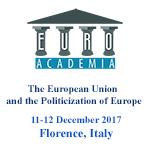Euroacademia Conferences
 Europe Inside-Out: Europe and Europeanness Exposed to Plural Observers (9th Edition) April 24 - 25, 2020
Europe Inside-Out: Europe and Europeanness Exposed to Plural Observers (9th Edition) April 24 - 25, 2020 Identities and Identifications: Politicized Uses of Collective Identities (9th Edition) June 12 - 13, 2020
Identities and Identifications: Politicized Uses of Collective Identities (9th Edition) June 12 - 13, 2020 8th Forum of Critical Studies: Asking Big Questions Again January 24 - 25, 2020
8th Forum of Critical Studies: Asking Big Questions Again January 24 - 25, 2020 Re-Inventing Eastern Europe (7th Edition) December 13 - 14, 2019
Re-Inventing Eastern Europe (7th Edition) December 13 - 14, 2019 The European Union and the Politicization of Europe (8th Edition) October 25 - 26, 2019
The European Union and the Politicization of Europe (8th Edition) October 25 - 26, 2019 Identities and Identifications: Politicized Uses of Collective Identities (8th Edition) June 28 - 29, 2019
Identities and Identifications: Politicized Uses of Collective Identities (8th Edition) June 28 - 29, 2019 The European Union and the Politicization of Europe (7th Edition) January 25 - 26, 2019
The European Union and the Politicization of Europe (7th Edition) January 25 - 26, 2019 7th Forum of Critical Studies: Asking Big Questions Again November 23 - 24, 2018
7th Forum of Critical Studies: Asking Big Questions Again November 23 - 24, 2018 Europe Inside-Out: Europe and Europeanness Exposed to Plural Observers (8th Edition) September 28 - 30, 2018
Europe Inside-Out: Europe and Europeanness Exposed to Plural Observers (8th Edition) September 28 - 30, 2018 Identities and Identifications: Politicized Uses of Collective Identities (7th Edition) June 14 - 15, 2018
Identities and Identifications: Politicized Uses of Collective Identities (7th Edition) June 14 - 15, 2018
The European Union Crisis as a Crisis of Equality
-
-

-
Presentation speakers
- Mario Juarez-Garcia, University of Arizona, USA
Abstract:
This paper aims to demonstrate that the solution to the 2008 crisis in Europe has not been attained because the union lacks a cardinal element for social cooperation: equal treatment of citizens. No political institution that treats its members unequally is stable. Inspired by Thomas Christiano’s theory of political equality, I develop an analytical tool (called “The function of equality”) that allows me to study the different political paradigms that try to guarantee cooperation and equality in Europe: national, cosmopolitan and post-national paradigms. After analyzing each one of them, I show why they fail to ensure equal treatment for European citizens. Nonetheless, this paper strives to demonstrate that a European demos is already in place de facto. The 2008 economic crisis weakened the regional political design but also revealed that Europe is a social union (a common world), that faces shared problems that require the equal participation of the people involved so as to implement legitimate collective decisions. The core of my argument is that such a common world requires the transfer of political sovereignty to a regional level in the form of a state or a federation to face common challenges with real common decisions. Likewise, part of this project is to tell, from a different perspective, a history that has been told several times: the recent history of European integration, its crisis, and its current unstable situation. The novelty of this paper is to present a narrative from the perspective of political equality, which leads us to two parallel lessons: one for the EU and another for the egalitarian theory. (i) I surmise that the European crisis can only be solved within a European state, (ii) I conclude that the postmodern attempts to sever the state from an objective common world are doomed to fail.
-
Related Presentations

What is the ‘Wright’ Modernism of the Mid-Century Cold War? American Design in Mid-Century Cold War Propaganda
- Heather Elisabeth













